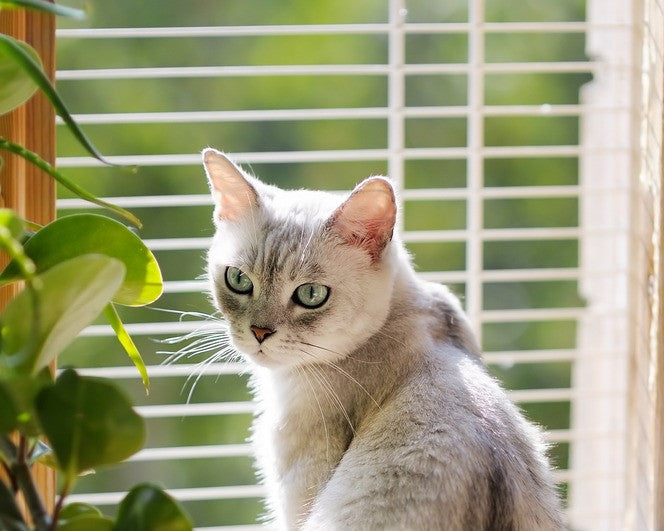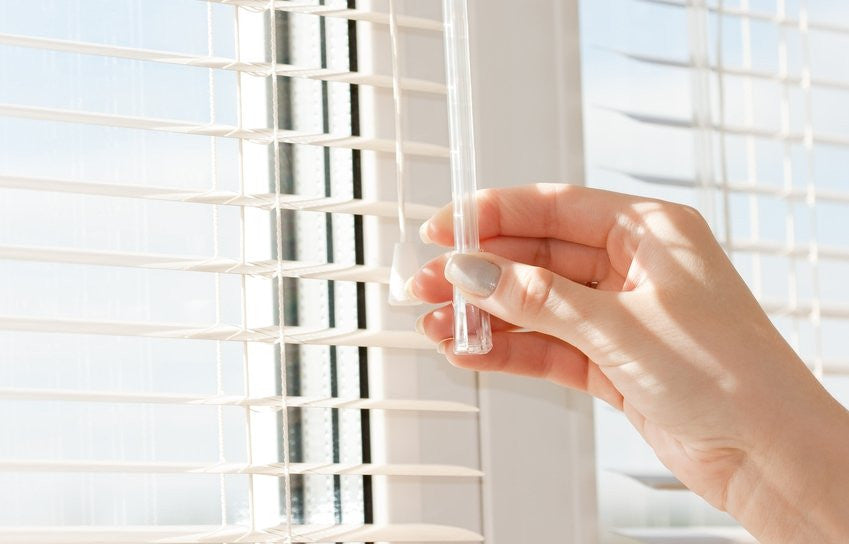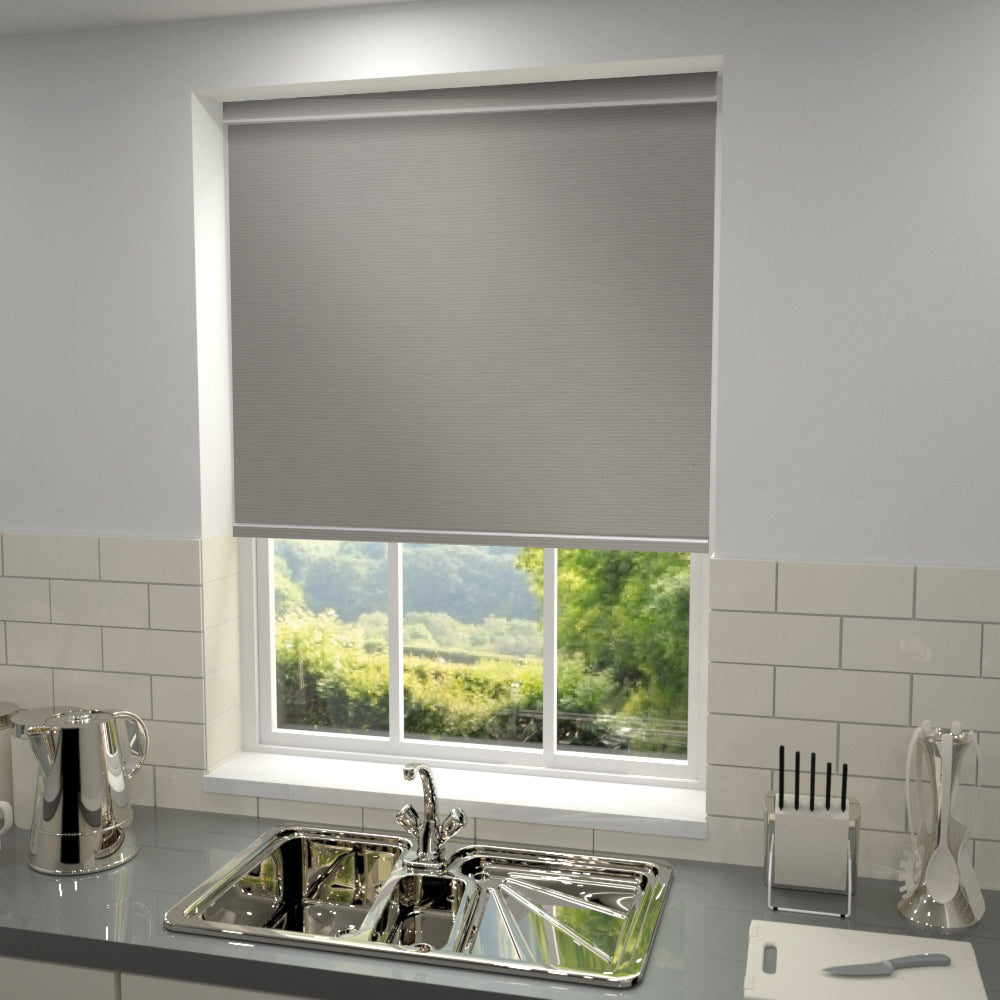
How do I keep my blinds protected from damage caused by dogs, cats and other pets?

The expression goes "prevention is better that cure", meaning it's easier to take preventative measures to stop a problem, than it is to wait for it occur and try to solve it later. This perfectly sums up our approach to blind damage caused by cats and dogs. Rather than fixing the damage once it's too late, it makes more sense to take a few steps to discourage and dissuade your pet from taking an interest in your blinds in the first place. This will include some basic approaches and topics:
- Considering your cats or dogs perspective
- Understanding territorial behaviour and animal instincts
- Chewing to overcome boredom and inactivity
- Chewing as a form of stress relief
- Choosing the right type of blind: venetian or vertical?
- Vertical or venetian blinds: which is best for your cat or dog?
- Deterrents and home remedies for preventing cats and dogs from destroying blinds
- Smells and sprays to deter cats from your window blinds
- Smells and sprays to deter dogs from your window blinds
Considering your cats or dogs perspective
If you've ever watched a show about animal behaviour, such as The Dog Whisperer or My Cat From Hell, then you'll know that cats and dogs have predictable traits and tendencies. What seems like an anarchistic act of destruction, usually has a logical cause when you consider the point of view of your cat or dog.

Understanding territorial behaviour and animal instincts
If you have the above mindset when approaching the problem of blind destruction in your home then you will soon realise that your blinds actually restrict your pets view. Dogs and especially cats are very territorial, they like to survey your home and the surrounding area for potential threats. They are also curious like you or me. So just like your or me, they crave visual stimulation.
Solution: Why not just raise your blind so they give your cat or dog an unrestricted view of your garden? This simple compromise gives you privacy yet allows your furry friend to still have a nice view out of your home. Simple, yet a lot of pet owners swear by this solution as it allows a pet to see approaching guests or the cause of an unidentified noise. This means they won't be startled or agitated as often, and won't need to destroy your blinds to see what is going on outside. The only drawback is that in a bedroom it will let unwanted light into the room, which may cause you to wake earlier than desired.
Alternatively, for cats you could consider buying a tower for them to sit on, this will allow them to perch above floor level and give them a better view of the room. If placed next to a window they will also be able to see outside in a way that protects your blinds from damage.
Chewing to overcome boredom and inactivity
Dogs in particular like to chew on all manner of things, from bones and treats to chew toys, and when they have none of these shoes, furniture and even blinds. Sometimes they do this as they have excess energy, because they are bored or even as a form of stress relief. If you understand these motives then you can take steps to accommodate their need to chew.
Solution: If you think your dog chews because they have too much energy then it is a good idea to increase the amount of time they go for a walk. Similarly, for cats you can increase their playtime. People often think cats are sedentary and don't need to be played with but in fact this isn't always true, as certain breeds will need stimulation to account for the lack of natural exercise they would do in the wild.
There are a lot of toys designed for cats, some are battery operated whereas others will need you to actively play with your cat. Whether you have a dog or cat, getting them tired before leaving the home could be all they need to tire them out, and leave them with little or no energy to destroy your blind.
Alternatively, you might want to give your cat or dog a special toy or treat for them to chew on. However, the key is to keep treats novel and exciting, as it is when a pet gets bored with a particular chew toy that they will explore and find something else to chew on. So you can mix up which toy or treat you give them, cover them in a new flavour of pet food, or hide the toy in a safe place within the home and let them work to find it.

However, if you are encouraging pets to play with or chew a treat instead of window blinds, then it is advisable to keep the play area some distance away from the blinds. The same applies to a feeding and relaxing area too, this needs to be away from the blinds you want to protect. By doing this you will help your cat or dog to know the difference between the play area, and a place where that behaviour is unacceptable. Learning the difference isn't achieved over night but avoiding confusion will make it easier for a pet to understand what is acceptable and what isn't.
Chewing as a form of stress relief
You need to consider that chewing might be a learnt coping strategy to a stressful situation or to feelings of separation anxiety. Unintentionally many pets actually learn to become stressed about you leaving the home from your own behaviour. If when you leave the home you act normally and ensure your pet remains calm then usually once you leave they will be perfectly fine. However, if you get them worked up and over-excited then once you leave they really do notice your absence. You are inadvertently teaching them to become over excited, stressed and subsequently chew things they shouldn't.
Solution: When you leave the home you need to act like nothing is out of the ordinary, a business as usual attitude. If you don't make a big deal about you leaving the house then neither will your pets. For 10 minutes before leaving the home ignore your dog or cat, so that they are not stimulated by your presence, and won't become agitated when you finally go through the front door. By keeping the mood neutral your dog will stay calm and won't have a spike in energy levels when they are alone in the home.
Choosing the right type of blind: venetian or vertical?
Moving now to a more practical approach, it is not always possible to train or condition your cat or dog to behave in the way you want. Of course we can try some of the steps above, and we can try to understand why they act the way they do but in reality it is not always possible to anticipate their needs, and to accommodate their needs within the home. So, sometimes it is us "the humans" that have to make compromises, and change our home to better suit our furry friends. This could be something simple like keeping blinds open slightly to allow pets to see outside (mentioned above) or it could be choosing a blind type that better suits their needs.Vertical or venetian blinds: which is best for your cat or dog?
When you think about it certain types of blinds are better for your pets than others. If you imagine you are a cat and you are looking up at Venetian blinds, especially open Venetian blinds, then right in front of you there is a bunch of evenly spaced horizontal beams that you can step up on to without much difficulty. Plus, depending on their strength you may even be able to climb from the lower slats to the higher ones - you are a cat after all, and are quite a good climber.

Whereas if you are faced with vertical blinds then you will find it a lot easier to just nudge a slat out of the way so that you can get to the view from the window. Why go to the trouble of clambering up these swaying loose blinds when you can just move them out of the way to get to what you want.
Solution: There is the crucial difference from the point of view of a cat - Venetian blinds are a obstruction that is waiting to be climbed, whereas a vertical blind can be conveniently nudged out of the way. If you comb the internet you will find a lot of anecdotal evidence that backs up this solution, a lot of pet owners say that vertical blinds get destroyed less often, and are more pet friendly than Venetian blinds.
So if in doubt then go for a vertical blind, if you are lucky then your cat or dog will just leave them alone. Plus, if this is not the case then these blind slats are so much easier to replace. They can be conveniently clipped out of the frame and unhooked from the chain at the bottom, and you can swap in a new blind slat without any issues. Roller blinds and roman blinds are also a consideration, however just like Venetian blinds these will take up the full width of the window. This means that when they are closed they will block out your pets view of the outside world, and are just as likely to be chewed up as Venetian blinds.
Note: Also, bear in mind that you should tie back chains or cords to prevent your cat or dog from getting tangled in them. This is also best practice if you have children in the home too, as these cords are a suffocation risk. So take every precaution you can to keep a cord and chain secure. New blinds (by law) should have safety devices attached as standard, so if you have an older blind (bought before the recent change in the law) then you will need to buy a safety device.Deterrents and home remedies for preventing cats and dogs from destroying blinds
Lastly, if all else fails some pet owners will consider some form of deterrent smell or spray that will make cats and dogs less inclined to chew or gnaw at your blinds. This isn't an option for everyone, but you can either buy or make a home remedy that will have an off-putting smell, this will then make your pet steer clear of the sprayed area. These are non-toxic sprays that just have a particular smell that the cat or dog doesn't like yet humans can barely smell. You shouldn't spray these at your cat or dog as a form of punishment, but only use them sparingly on an area you want them to stay away from.

Note: We don't suggest you spray these on to a blind, as this may discolour or stain your blind. This is especially true for blinds made using fabric, or that aren't moisture resistant. Instead, use sparingly around the window and window sill to deter your pet from going near the window.
Smells and sprays to deter cats from your window blinds
Here is a list of common smells, sprays or home remedies that are supposed to deter cats from chewing or gnawing at furniture:- Purpose bought cat repellent spray (our recommendation)
- Citrus scented spays
- The herb rue can be used to make a homemade spray
- A cinnamon, rosemary, and lavender homemade spray
- Citronella oil
- Lemon thyme essence
- Oregano essence
- Peppermint essence
- Garlic cloves
- Vinegar spray, infused with any of the above
Smells and sprays to deter dogs from your window blinds
Again, here is a list of smells and sprays but these are to make your blinds less attractive to dogs:- Purpose bought dog repellent spray (our recommendation)
- Sour apple spray
- Pepper
- Citrus
- Vinegar
- Rubbing alcohol
- Ammonia












